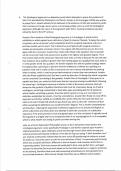Essay
A* Essays (92%) on the Ontological Argument
- Institution
- AQA
Answers the A01 question: Explain the ontological argument with reference to Anselm and Descartes. AO1 (20 marks) ( 19 marks scored) and A02 question: 'The ontological argument is more persuasive than the cosmological and teleological arguments for God's existence' Evaluate this view (27 m...
[Show more]



